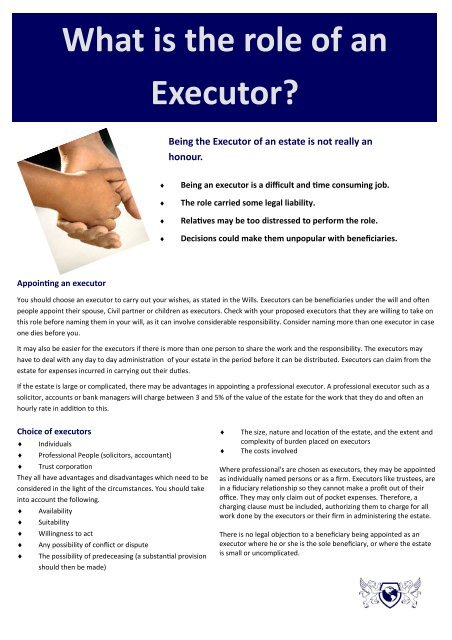Essential Info
You also want an ePaper? Increase the reach of your titles
YUMPU automatically turns print PDFs into web optimized ePapers that Google loves.
What is the role of an<br />
Executor?<br />
Being the Executor of an estate is not really an<br />
honour.<br />
¨<br />
¨<br />
¨<br />
¨<br />
Being an executor is a difficult and me consuming job.<br />
The role carried some legal liability.<br />
Relaves may be too distressed to perform the role.<br />
Decisions could make them unpopular with beneficiaries.<br />
Appoinng an executor<br />
You should choose an executor to carry out your wishes, as stated in the Wills. Executors can be beneficiaries under the will and oen<br />
people appoint their spouse, Civil partner or children as executors. Check with your proposed executors that they are willing to take on<br />
this role before naming them in your will, as it can involve considerable responsibility. Consider naming more than one executor in case<br />
one dies before you.<br />
It may also be easier for the executors if there is more than one person to share the work and the responsibility. The executors may<br />
have to deal with any day to day administraon of your estate in the period before it can be distributed. Executors can claim from the<br />
estate for expenses incurred in carrying out their dues.<br />
If the estate is large or complicated, there may be advantages in appoinng a professional executor. A professional executor such as a<br />
solicitor, accounts or bank managers will charge between 3 and 5% of the value of the estate for the work that they do and oen an<br />
hourly rate in addion to this.<br />
Choice of executors<br />
¨ Individuals<br />
¨ Professional People (solicitors, accountant)<br />
¨ Trust corporaon<br />
They all have advantages and disadvantages which need to be<br />
considered in the light of the circumstances. You should take<br />
into account the following.<br />
¨ Availability<br />
¨ Suitability<br />
¨ Willingness to act<br />
¨ Any possibility of conflict or dispute<br />
¨ The possibility of predeceasing (a substanal provision<br />
should then be made)<br />
¨<br />
¨<br />
The size, nature and locaon of the estate, and the extent and<br />
complexity of burden placed on executors<br />
The costs involved<br />
Where professional's are chosen as executors, they may be appointed<br />
as individually named persons or as a firm. Executors like trustees, are<br />
in a fiduciary relaonship so they cannot make a profit out of their<br />
office. They may only claim out of pocket expenses. Therefore, a<br />
charging clause must be included, authorizing them to charge for all<br />
work done by the executors or their firm in administering the estate.<br />
There is no legal objecon to a beneficiary being appointed as an<br />
executor where he or she is the sole beneficiary, or where the estate<br />
is small or uncomplicated.


